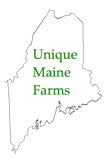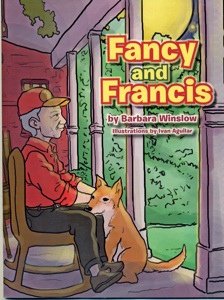Thoughts Shared From Gretchen Legler
Gretchen Legler is a Professor of Creative Writing at the University of Maine at Farmington. Below are excerpts from an essay that she wrote about Francis:
Word of mouth first brought me to Francis Fenton’s extraordinary apple orchard nearly a decade ago. It was there I encountered a universe of apples presided over by a spry, loquacious, old man whose entire life, give or take a few years, had been devoted to these fabulous, mythic, and entirely ordinary fruits of the earth. Since that first visit, I’ve taken groups of college students to Sandy River Apples in Mercer, Maine, every spring and every fall, sure in my conviction that Francis and his apples have something important to teach us all.
***
Bucking the current market system that favors only a handful of shippable varieties of apples (Macintosh, Cortland, Granny Smith, and the like), Francis continues to grow upwards of 143 different varieties, including at least one he invented himself—the Dolly Delicious, a yellow, thin-skinned apple that isn’t too tart, named after his late wife whose delicate constitution favored a sweeter, less acidic fruit.
***
Francis grew up in the modest white house which stands next to the white barn with its huge hand-hewn hemlock beams, which stands next to the long white apple shed with the big smiling dancing apple painted on the side. I was born in that house. I guess I’ll die in it, he says. Up until about 1940 life was okay out here in the woods and fields, then things sort of went to pot. All the guys left. They went out West. After World War II everyone left. I even left myself. He served in the Navy, but returned in 1972 to take over the farm, which had been vacant for 30 years. He regales guests with stories about the ship he sailed on during WWII and the battles he fought. He wears the blue and gold commemorative ship’s hat sometimes, other times it’s a sweaty, stained baseball cap. Most always he’s dressed in a plaid shirt, long sleeves buttoned around strong, boney wrists, work boots and khaki pants, all hanging off his thin frame. His eyes are deep blue and milky, his skin colored with age spots, his hands cragged, like the limbs of the trees. He shakes. A fact a life, he’d say. Aint’ none of us get out of this world alive.
***
Francis is a connoisseur of labor--someone who has paid close attention to the ways that physical effort produces things of value, and the ways that the ratio of effort to value has changed over time. It took hard work, real labor, to replant the apple orchard after the pines had moved in-- the kind of labor that is unfamiliar to many of us today—what you’d call back-breaking.
***
My age, see, is the machine age, but before that, back then, they made powerful men, powerful men, men who could eat a big bowl of cornmeal mush for breakfast then go out and work all day, cutting down trees, taking big chips out. I try that with an axe and it looks like a beaver had been at it…in those days they’d work at it and a big chip would fly right out. Cornmeal mush for breakfast and another bowl at dinner and they’d go to bed and get up and do it all again. My father had a either a spade handle or an ax handle in his hands all his life. Those men, those powerful men, they’d shave off the calluses with a jackknife. Those were some powerful men.
***
When I think of Francis I think that he truly knows the meaning of wealth--for him it is in the care of the land and the care of the apple trees.







